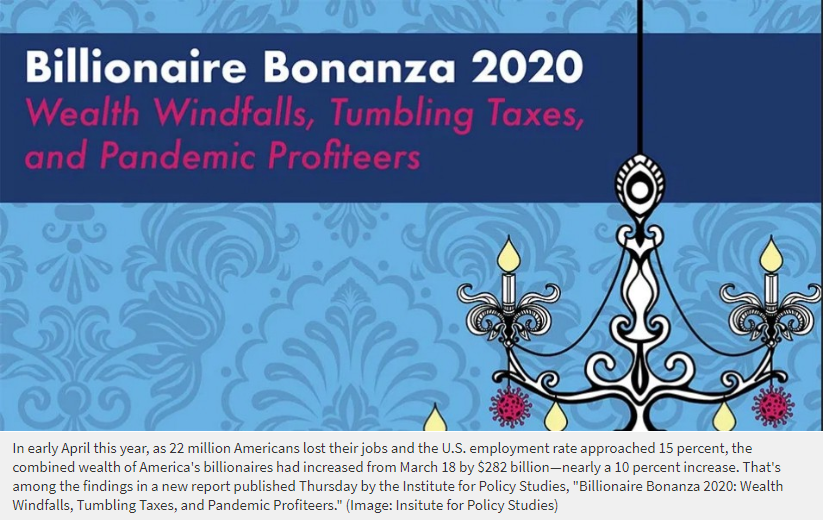U.S. Billionaire Wealth Surges as Covid-19 Pandemic Worsens
April 23, 2020

As the pandemic-fueled U.S. unemployment rate approaches 15 percent, America’s billionaire class is experiencing a wealth surge, according to a new Institute for Policy Studies report that I co-authored with Omar Ocampo and Sophia Paslaski, Billionaire Bonanza 2020.
Between March 18th and April 23th, as more than 26 million U.S. workers lost their jobs, the combined wealth of America’s billionaires increased by $308 billion, a 10.5 percent increase. After a brief decline, the collective wealth of 614 U.S. billionaires has surpassed than their 2019 levels.
The Jeff Bezos wealth surge is unprecedented in modern financial history. As of April 15, his fortune had increased by an estimated $25 billion since January 1, 2020. This is greater than the Gross Domestic Product of Honduras, $23.9 billion in 2018.
Between January 1, 2020 and April 10, 2020, 34 of the nation’s wealthiest 170 billionaires have seen their wealth increase by tens of millions of dollars.
Eight of these billionaires — the “pandemic profiteers” –have seen their net worth surge by over $ 1 billion. In addition to Bezos, they include billionaires that have profited off of America’s urgent need for video conferencing, including Steve Ballmer of Microsoft, owner of Skype and Teams, and Eric Yaun, founder and CEO of Zoom.
The Billionaire Bonanza 2020 report looks at several longer-term trends over the last several decades, drawing from Forbes recent survey of global billionaires.
Between 1990 and 2020, U.S. billionaire wealth soared 1,130 percent in 2020 dollars, an increase more than 200 times greater than the 5.37 percent growth of U.S. median wealth over this same period.
Between 1980 and 2018, the tax obligations of America’s billionaires, measured as a percentage of their wealth, decreased a staggering 79 percent.
The billionaire share of America’s increased wealth has risen throughout the past four decades. Between 2006 and 2018, nearly 7 percent of the real increase in America’s wealth went to the country’s 400 wealthiest households.
Congress should act to ensure that the pandemic and recovery don’t further worsen the U.S. wealth divide. As part of a program for a just recovery, we should press for:
A Bottom-up People’s Stimulus Program. Stimulus bills should be designed not to bail out large corporations, but put money in the hands of customers to stimulate “bottom up” economic activity.
Creation of a Pandemic Profiteering Oversight Committee. Congress needs to convene an oversight commission, modeled after the Truman Commission during World War II, to both monitor the stimulus package and root out corruption and profiteering in society as a whole.
Enact an Excess Profits Tax. During the major wars of the 20th century, Congress instituted excess profits taxes to discourage speculating and profiteering around the basic needs of life. These taxes proved workable and effective.
Levy an Emergency Millionaire Surtax. Congress should signal to the wider public that the first several trillion dollars of revenue raised to help cover the nation’s recovery costs will come from the billionaires and richest 0.2 percent of taxpayers — those Americans who have seen the most enormous gains over the last several decades. Congress could levy an emergency 10 percent millionaire surtax on the top 0.2 percent, those with incomes over $2 million.
Create a Charity Stimulus. Billionaires have for years now been donating funds to donor-advised funds and private foundations, accepting tax breaks, and warehousing over $1.2 trillion in funds that ought to be distributed to charitable operations. Congress should act to mandate a timely payout of these taxpayer-subsidized charity funds to fulfill the public interest.
Shut Down the Hidden Wealth System. Congress should crack down on capital flight and wealth hiding. As much as $21 trillion in wealth is now sitting hidden in offshore tax havens, shell companies, and trusts. For any tax policies to be effective, Congress must shut down the international wealth hiding apparatus by using legislation, trade negotiations, and international sanctions to require greater corporate transparency, eliminate tax dodges, and provide greater resources for tax enforcement.
We should exit the pandemic and the economic chaos of these months with less inequality, not a further entrenched oligarchy.
Originally posted at Common Dreams
Image credit: Institute for Policy Studies
